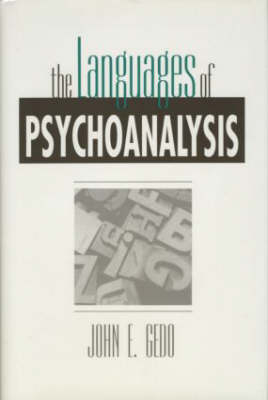
The Languages of Psychoanalysis
Analytic Press,U.S. (Verlag)
978-0-88163-186-9 (ISBN)
In this remarkable survey of "the communicative repertory of humans," John Gedo demonstrates the central importance to theory and therapeutics of the communication of information. He begins by surveying those modes of communication encountered in psychoanalysis that go beyond the lexical meaning of verbal dialogue, including "the music of speech," various protolinguistic phenomena, and the language of the body. Then, turning to the analytic dialogue, Gedo explores the implications of these alternative modes of communication for psychoanalytic technique. Individual chapters focus, in turn, on the creation of a "shared language" between analyst and analysand, the consequences of the analytic setting, the form in which the analyst casts particular interventions, the curative limits of empathy, the analyst's affectivity and its communication to the patient, and the semiotic significance of countertransference and projective identification.
Gedo does not proffer semiotics as a substitute for metapsychology. He is explicit that communicative skill is always dependdent on somatic events within the central nervous system. Indeed, it is because Gedo's hierarchical approach to communication builds on our current understanding of a hierarchically organized central nervous system that his clincal observations become insights into basic psychobiological functioning. Grounded in Gedo's four decades of clinical experience, The Languages of Psychoanalysis points to a new venue of clinical research and conceptualization, one in which attentiveness to issues of communication will not only foster linkages with contemporary neuroscience, but also clarify and enlarge the therapeutic possibilities of psychoanalytic treatment.
John E. Gedo, M.D., retired in 1990 as Training and Supervising Analyst, Chicago Institute for Psychoanalysis. He is the author of numerous books for Analytic Press, including The Biology of Clinical Encounters (1991) and The Mind in Disorder (1998).
Part I: Psychoanalysis and Semiotics. Psychoanalysis and Nonverbal Communication. Protolinguistic Phenomena in Psychoanalysis. The Primitive Psyche, Communication, and the Language of the Body. Speech as Manipulation. Epigenesis, Regression, and the Problem of Consciousness. Part II: On the Analytic Dialogue. Treatment as the Development of a Shared Language. Channels of Communication and the Analytic Setup. Analytic Interventions: The Question of Form. Empathy, New Beginnings, and Analytic Cure. More on the Affectivity of the Analyst. On Countertransference and Projective Identification, and the Question of Intersubjectivity. Part III: Intrapsychic Communication. The Self as True or False, Crazy or Sane. Working Through as Metaphor for Treatment Modality. On Fastball Pitching, Astronomical Clocks, and Self-Cognition.
| Erscheint lt. Verlag | 12.6.1996 |
|---|---|
| Verlagsort | Hillsdale |
| Sprache | englisch |
| Maße | 152 x 229 mm |
| Gewicht | 476 g |
| Themenwelt | Geisteswissenschaften ► Geschichte ► Regional- / Ländergeschichte |
| Geisteswissenschaften ► Psychologie ► Psychoanalyse / Tiefenpsychologie | |
| Geisteswissenschaften ► Sprach- / Literaturwissenschaft ► Sprachwissenschaft | |
| Medizin / Pharmazie ► Medizinische Fachgebiete ► Psychiatrie / Psychotherapie | |
| Sozialwissenschaften ► Politik / Verwaltung ► Europäische / Internationale Politik | |
| ISBN-10 | 0-88163-186-8 / 0881631868 |
| ISBN-13 | 978-0-88163-186-9 / 9780881631869 |
| Zustand | Neuware |
| Haben Sie eine Frage zum Produkt? |
aus dem Bereich


